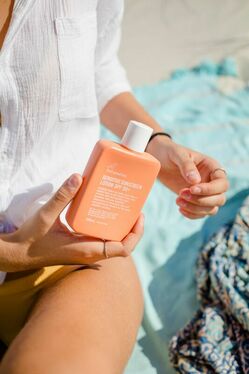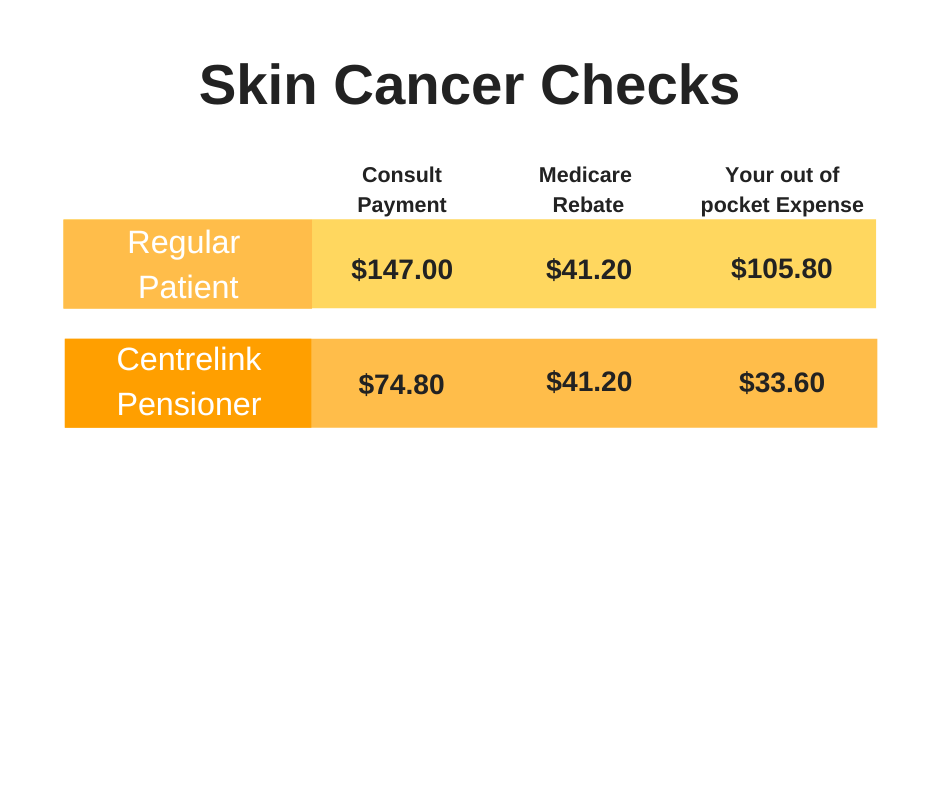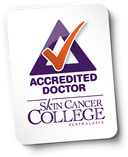
Utilising the latest equipment, we ensure that your skin conditions are professionally assessed and treated by our doctors. Our purpose built facilities enable our staff and doctors to provide you with quality care in modern and comfortable surroundings.
Dr Cockerill has run his own private medical practice in Geraldton for over 40 years. Having always had a passion for skin health he founded the Geraldton Mole & Skin Cancer Clinic in 2007, and he performs complex skin cancer surgery since then.
A GP, Anaesthetist and Fellow of the Australasian Skin Cancer College.
Dr Kumar, Dr Loh and our specialist nurses have all completed a Certificate of Dermoscopy with the Skin Cancer College Australasia.
Please contact City Health Geraldton today to make an appointment to discuss your Skin Health needs.
Dr Cockerill has run his own private medical practice in Geraldton for over 40 years. Having always had a passion for skin health he founded the Geraldton Mole & Skin Cancer Clinic in 2007, and he performs complex skin cancer surgery since then.
A GP, Anaesthetist and Fellow of the Australasian Skin Cancer College.
Dr Kumar, Dr Loh and our specialist nurses have all completed a Certificate of Dermoscopy with the Skin Cancer College Australasia.
Please contact City Health Geraldton today to make an appointment to discuss your Skin Health needs.
What is Skin Cancer?
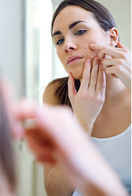
Skin cancer occurs when skin cells are damaged, for example, by overexposure to ultraviolet (UV) radiation from the sun.
There are three main types of skin cancer
Both basal cell carcinoma and squamous cell carcinoma are known as non-melanoma skin cancer.
Two in three Australians will be diagnosed with skin cancer by the time they are 70, with more than 434,000 people treated for one or more non-melanoma skin cancers in Australia each year. Non-melanoma skin cancer is more common in men, with almost double the incidence compared to women.
There are three main types of skin cancer
- Basal cell carcinoma
- Squamous cell carcinoma
- Melanoma - the most dangerous form of skin cancer
Both basal cell carcinoma and squamous cell carcinoma are known as non-melanoma skin cancer.
Two in three Australians will be diagnosed with skin cancer by the time they are 70, with more than 434,000 people treated for one or more non-melanoma skin cancers in Australia each year. Non-melanoma skin cancer is more common in men, with almost double the incidence compared to women.
Skin Cancer Symptoms
The sooner a skin cancer is identified and treated, the better your chance of avoiding surgery or, in the case of a serious melanoma or other skin cancer, potential disfigurement or even death.
It is also a good idea to talk to your doctor about your level of risk and for advice on early detection.
Become familiar with the look of your skin, so you pick up any changes that might suggest a skin cancer. Look for:
It is also a good idea to talk to your doctor about your level of risk and for advice on early detection.
Become familiar with the look of your skin, so you pick up any changes that might suggest a skin cancer. Look for:
- any crusty, non-healing sores
- small lumps that are red, pale or pearly in colour
- new spots, freckles or any moles changing in colour, thickness or shape over a period of weeks to months (especially those dark brown to black, red or blue-black in colour).
Causes of Skin Cancer
Treatment for Skin Cancer
Skin cancers are almost always removed. In more advanced skin cancers, some of the surrounding tissue may also be removed to make sure that all of the cancerous cells have been taken out.
Common skin cancers can be treated with ointments, radiation therapy or photo-dynamic therapy. They can also be removed with surgery (usually under a local anaesthetic), cryotherapy (using liquid nitrogen to rapidly freeze the cancer off), curettage (scraping) or cautery (burning).
Our skin cancer accredited doctors can perform your skin cancer right here in the centre in our custom built theatre. No need for lengthy wait times on the public health wait lists or having to travel to Perth.
Common skin cancers can be treated with ointments, radiation therapy or photo-dynamic therapy. They can also be removed with surgery (usually under a local anaesthetic), cryotherapy (using liquid nitrogen to rapidly freeze the cancer off), curettage (scraping) or cautery (burning).
Our skin cancer accredited doctors can perform your skin cancer right here in the centre in our custom built theatre. No need for lengthy wait times on the public health wait lists or having to travel to Perth.
Photo-dynamic Therapy
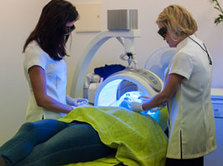
PDT is a revolutionary new way to treat sun damaged, blemished and aged skin on all areas of the body. The process involves a naturally occurring lotion being applied to the skin and then being activated with a laser light source. The light source destroys abnormal skin cells. PDT boasts both medical and cosmetic benefits.
Medically PDT eliminates abnormal (cancer causing) or damaged cells beneath the skin’s top layer. Cosmetically the skin is left with new, fresh and healthy cells which give new life to what was previously aged and tired looking skin.
In addition to the above mentioned uses PDT is effective in treating rosacea, acne, large pores, fine lines, pigmentation and skin discolouration. Please discuss with the doctor during your skin check if PDT would be suitable for you.
PDT requires pre and post treatment care, and downtime.
Medically PDT eliminates abnormal (cancer causing) or damaged cells beneath the skin’s top layer. Cosmetically the skin is left with new, fresh and healthy cells which give new life to what was previously aged and tired looking skin.
In addition to the above mentioned uses PDT is effective in treating rosacea, acne, large pores, fine lines, pigmentation and skin discolouration. Please discuss with the doctor during your skin check if PDT would be suitable for you.
PDT requires pre and post treatment care, and downtime.
What will happen during my skin check
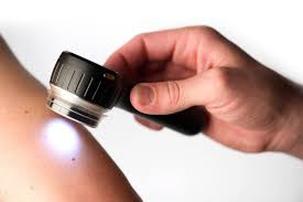
Examination
Many skin cancers are undetected or unnoticed by the patient, and a full body check-up sometimes reveals problems that the patient did not know about. This is why we recommend a full body examination for almost all patients. For a full skin examination, you will need to undress to your underwear. We will provide a blanket to wrap around yourself if you wish. We do request that no make up is worn for your skin check so the skin can be properly checked.
The doctor will carefully inspect your body all over, looking for abnormal skin lesions or moles with unusual colours or shapes.
We do not routinely examine the genital area unless you ask us to do so. Skin cancers are extremely rare in this area, but we are happy to examine any spots that concern you.
The doctor will closely examine any unusual spots with a dermoscope. This is an instrument that magnifies and lights up the skin, allowing the doctor to see through the top layer of the skin. With a dermoscope, a doctor can tell if a mole or spot is normal or abnormal. Dermoscopy has been proven to significantly increase the rate of skin cancer detection.
Photography
We use a specialised skin lesion photography (Mole Max) system which allows us to:
Depending on the outcome of your skin check, follow-up might include the following:
Many skin cancers are undetected or unnoticed by the patient, and a full body check-up sometimes reveals problems that the patient did not know about. This is why we recommend a full body examination for almost all patients. For a full skin examination, you will need to undress to your underwear. We will provide a blanket to wrap around yourself if you wish. We do request that no make up is worn for your skin check so the skin can be properly checked.
The doctor will carefully inspect your body all over, looking for abnormal skin lesions or moles with unusual colours or shapes.
We do not routinely examine the genital area unless you ask us to do so. Skin cancers are extremely rare in this area, but we are happy to examine any spots that concern you.
The doctor will closely examine any unusual spots with a dermoscope. This is an instrument that magnifies and lights up the skin, allowing the doctor to see through the top layer of the skin. With a dermoscope, a doctor can tell if a mole or spot is normal or abnormal. Dermoscopy has been proven to significantly increase the rate of skin cancer detection.
Photography
We use a specialised skin lesion photography (Mole Max) system which allows us to:
- Take high-magnification photographs of spots.
- Take photographs of your whole body, or regions of your body. If these photographs are repeated, our computer can automatically determine on your next visit if you have developed new spots or if there are significant changes in the spots that were already present.
Depending on the outcome of your skin check, follow-up might include the following:
- If you have mildly atypical non-standard) spots, we will ask you to return (usually in three months) so that we can re-examine and re-photograph them. If they don’t change significantly, it's unlikely that they are skin cancer.
- If any spots look significantly abnormal, we will make arrangements to either diagnose or remove the lesion. We can easily remove or biopsy most lesions in our treatment room, or we can arrange referral to a specialist surgeon if required.
- Based on your risk factors, skin type and any abnormal lesions we discover, we will make recommendations about when you should return in future for regular full body skin check-ups.
Fee's & Charges
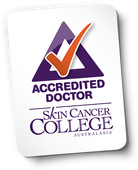
All doctors and nurses performing Skin Cancer checks and surgery are accredited with the Skin Cancer College of Australasia.
Any surgery or treatments performed may incur additional charges, this can be discussed with your doctor during the initial consult. But please be aware that until the surgery is actually performed and dependent what type of lesion is removed we are unable to give you an exact amount prior to surgery.
Please note these fee's and charges are subject to change at any time.
Any surgery or treatments performed may incur additional charges, this can be discussed with your doctor during the initial consult. But please be aware that until the surgery is actually performed and dependent what type of lesion is removed we are unable to give you an exact amount prior to surgery.
Please note these fee's and charges are subject to change at any time.
For more information on Skin Cancer please visit The Cancer Council of Australia
We stock a fantastic range of skin repairing products,
please ask at you next appointment about these products.
please ask at you next appointment about these products.


